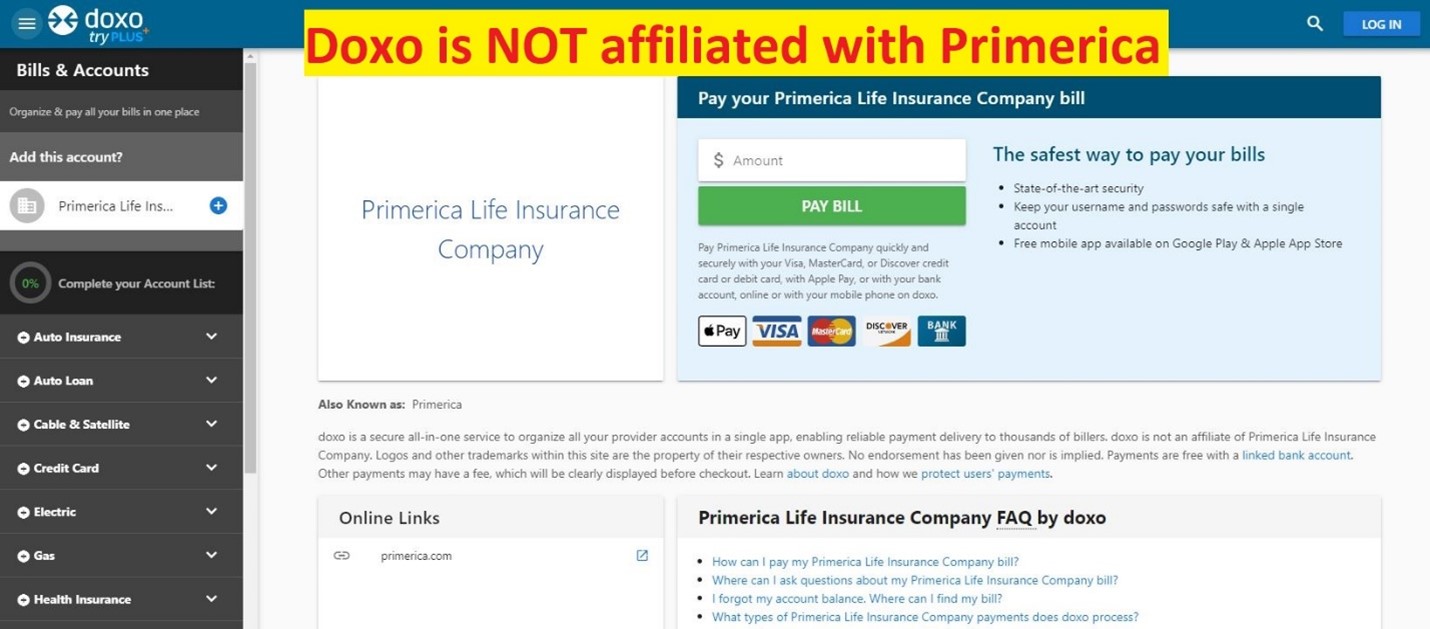Primerica Fraud Alert
Primerica Doxo.com Alert - Warning about Doxo.com Third-Party Payment Website
CRYPTOCURRENCY SCAM ALERT
LOTTERY WINNINGS / SWEEPSTAKES FRAUD ALERT
Primerica Doxo.com Alert - Warning about Doxo.com Third-Party Payment Website
Doxo.com is not affiliated with any Primerica companies (including Primerica Life Insurance Company, National Benefit Life Insurance Company, and Primerica Life Insurance Company of Canada). Doxo.com is a website that charges users to make payments to companies on their behalf. Payments made using Doxo.com are not immediately delivered to Primerica companies and using this service for life insurance payments may result in a late payment which could lead to a lapsed policy.

To ensure you are submitting a life insurance policy payment directly to the life insurance company, please follow the instructions on your bill. Life insurance policy owners are encouraged to make payments and update payment information in the client self-service portal at MyPrimerica.com. Payments and related questions can also be addressed by calling us at the phone numbers listed below.
- Primerica Life Insurance Company and National Benefit Life Insurance Company
- 1-800-257-4725 (US)
- Primerica Life Insurance Company of Canada:
- 1-800-387-7876 (Canada English)
- 1-800-265-4804 (Canada French)
- Additional Primerica company contact information is listed on our Contact Us page
CRYPTOCURRENCY SCAM ALERT
There are cryptocurrency scam operations that are illegally impersonating legitimate investments companies and targeting consumers.
Protect Yourself! Watch for the Signs of a Scam
Cryptocurrency (Bitcoin, Ether, etc.) is a type of digital currency that generally only exists electronically. Scammers are always finding new ways to steal your money. One sure sign of a scam is anyone who says you have to pay by cryptocurrency. In fact, anyone who tells you to pay by wire transfer, gift card, or cryptocurrency is a scammer. If you pay, there's almost no way to get that money back.
Neither PFS Investments nor its affiliate companies require (or accept) payment by cryptocurrency.
Here are some cryptocurrency scams to watch out for:
- Unsolicited offers from supposed "investment managers" who say they can help you grow your money if you give them the cryptocurrency you've bought. But once you log in to the "investment account" they opened, you'll find that you can't withdraw your money unless you pay fees.
- If you read a tweet, text, email, or get a message on social media that tells you to send cryptocurrency, it's a scam. That's true even if the message came from someone you know, or was posted by a celebrity or company you follow. Their social media accounts might have been hacked. Report the scam immediately to the social media platform, and then tell the Federal Trade Commission (FTC) at ReportFraud.ftc.gov.
How to Spot Cryptocurrency Scams
- Scammers make big claims without details or explanations. Smart business people want to understand how their investment works, and where their money is going. And good investment advisors want to share that information.
- Before you invest, check it out. Research online for the name of the company and the cryptocurrency name, plus words like "review," "scam," or "complaint." See what others are saying.
How To Report Cryptocurrency Scams
Report fraud and other suspicious activity involving cryptocurrency to
- the FTC at ReportFraud.ftc.gov
- the Commodity Futures Trading Commission (CFTC) at CFTC.gov/complaint
- the U.S. Securities and Exchange Commission (SEC) at sec.gov/tcr
- the cryptocurrency exchange company you used to send the money
The FTC also provides valuable information on how to detect and avoid cryptocurrency scams and what to do if you engaged with a scammer on its website at https://www.consumer.ftc.gov/articles/what-know-about-cryptocurrency-and-scams.
LOTTERY WINNINGS / SWEEPSTAKES FRAUD ALERT
Protect Yourself! Watch for the Signs of Fraud
There is a counterfeit check fraud operation that is illegally mailing counterfeit checks bearing well-known company names with the purpose of misleading consumers into sending money to designated addresses in the United Kingdom and Canada. They are using the names of well-known companies on the checks in order to grant them a false air of legitimacy. Examples of names fraudulently used on such checks have included such prominent companies as The Walmart Foundation, Prudential Life Insurance Company and Primerica Life Insurance Company. Although the checks may bear the name of a reputable company, they are in fact counterfeit and cannot be cashed or deposited.
Here's how the fraud works:
The recipient may receive a letter indicating that they have won a lottery or sweepstakes prize for a significant sum, often for $250,000 or more. The letter includes an "advance check" for a small portion of the "prize," often as much as $5,000 or more. This check may bear the name of a legitimate and prominent company like those listed above. Although the listed company may be based in the United States, the letter is often postmarked from a foreign country such as Canada or the United Kingdom. The accompanying letter requests that the recipient call a number to wire money to pay "taxes" or "fees" on the prize which the enclosed check is meant to "reimburse." In fact, the enclosed check is counterfeit and will not be honored, and the fraudster simply keeps the wired money.
Neither Primerica Life Insurance Company nor its affiliate companies engage in any sweepstakes or lottery promotions, nor do they issue checks in connection with any such promotions.
If you receive a suspicious letter or check like those described, you may report the incident as a mail fraud complaint to the United States Postal Service at https://www.uspis.gov/report/. The Federal Trade Commission (FTC) also provides valuable information on how to detect and avoid fake check scams and what to do if you sent money to a scammer on its website at https://www.consumer.ftc.gov/articles/how-spot-avoid-and-report-fake-check-scams.